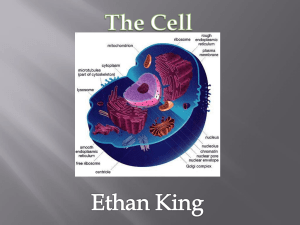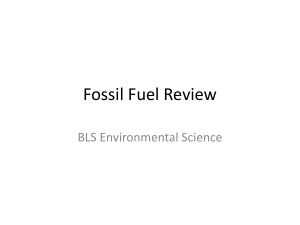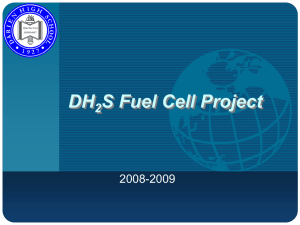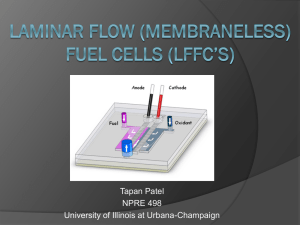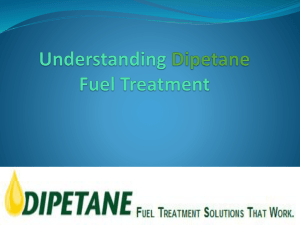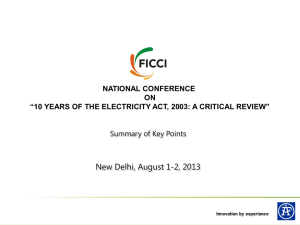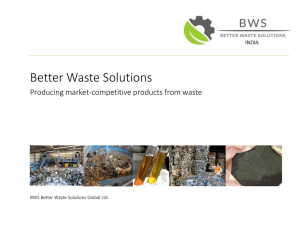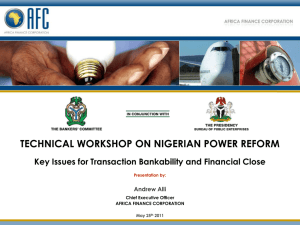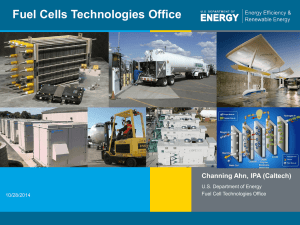PowerPoint-presentatie
advertisement
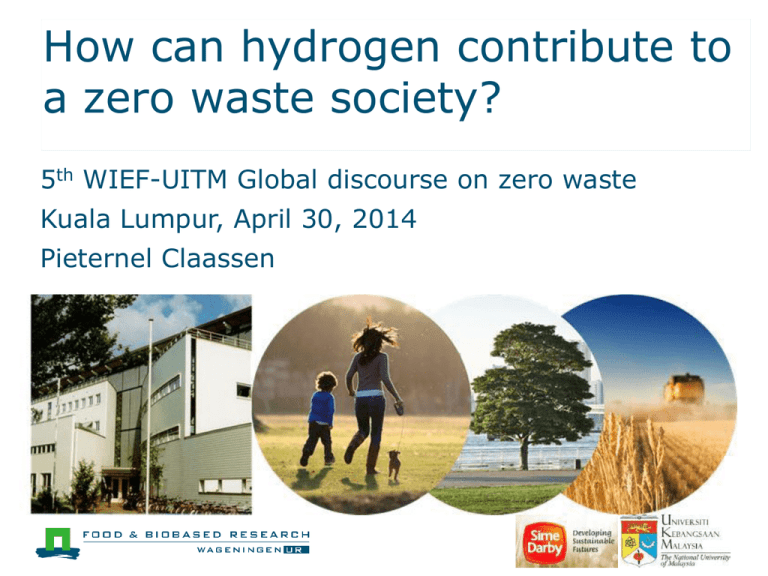
How can hydrogen contribute to a zero waste society? 5th WIEF-UITM Global discourse on zero waste Kuala Lumpur, April 30, 2014 Pieternel Claassen Zero waste, cradle to cradle, aaaaaacircular economy CO2 + H2 O Heat CnHmOp + O2 What is CnHmOp ? CnHmOp = biomass for food, chemicals, materials, aaaaaaaaaenergy Biomass = carbohydrates, proteins and lipids Residues are in ● Production of crops ● Processing industry ● Residues after main application Options for residues with air present Thermochemical process ● Combustion: heat and ash Biochemical process ● Composting: heat, fertiliser, humic acids Options for residues, no air present Thermochemical processes ● Pyrolysis: oil, gases and tar ● Gasification: CO, CH4, H2, alkenes and tar ● Hydrothermolysis: biocrude and tar Biochemical process ● Fermentation: organic acids, alcohols, CH4, H2 Zero waste, cradle to cradle, aaaaaacircular economy CO2 + H2O Heat CnHmOp + Products O2 Why hydrogen? Most widely-used chemical e.g. for fertiliser, food and electronics Fuel for fuel cells: H2 and O2 to electricity, heat and water Fuel cell properties Benefits of fuel cells: ● Superior efficiency (70%) as compared to combustion (35%) ● Low maintenance, no noise, robust ● Zero emission: no emission of NOx, SOx, CO or CO2 particulates, organic volatiles ● Reliable and can be used as stand alone ● Scalable to fit any power need Challenges: ● Cost ● Durability Examples of FC applications Toyota PEM fuel cell vehicle Hyster hydrogen forklift truck Adobe’s gas to power FC’s to supply 9.5 GWh per year Upp rechargeable fuel cell charger FC-CHP units in JA and GE outselling micro CHP’s Sources: The Fuel Cell Industry Review 2013 and Fuel Cells 200 www.fuelcelltoday.com,www.fuelcells.org,www.intelligent-energy.com Fuel cell applications and supply Portable Stationary Transport Power range 5 W - 20 kW kW to MW 1kW - 100 kW Examples Torches, cameras, battery chargers, mp3 players, communication/ navigation, auxiliary power units Combined Heat and Power units (micro/large), uninterruptible power supplies (telecom, offgrid back up) Cars, trucks and buses, materials handling trucks Supply Trailer/pressure vessels Pipeline for H2 or on-site Pipeline, on-site, production (SMR or cryogenic tank electrolysis) trailer Sources: The Fuel Cell Industry Review 2013 www.fuelcelltoday.com and Mulder et al. IHJE 32, 2007 208 Filling stations world wide (March 2013) 76 fuelling stations 80 fuelling stations 49 fuelling stations Domestic FC CHP units in ENE-Farm In 2012 subsidy at < 25% retail cost Cost decrease due to: • Fewer components • Economy of scale • Less platinum • Extended durability to 60 000h Number of FC CHP units sold in Japan and subsidy per unit. 2 million Yen = MYR 64439 Source: www.fuelcelltoday.com Feb 2013 Fuel cell distribution world-wide Asia is dominant in adopting FC technology Source: The Fuel Cell Industry Review 2013 www.fuelcelltoday.com Distribution of fuel cell power Korea is the leading country in adoption of large stationary fuel cell systems Source: The Fuel Cell Industry Review 2013 www.fuelcelltoday.com UKM-YSD Chair on Sustainable Development: Zero Waste Technology RM15 Million Endowment by Sime Darby Foundation since February 2011 Forging Mutually Beneficial Partnerships between UKM- Sime Darby Inspiring Futures, Nurturing Possibilities To turn palm oil mills into green factories-targeting for carbon neutral No pollutants to the air No pollutants to the ground No pollutants to the water -But yet; Increase of revenue long term productivity and sustainability of the oil palm industry ensured UKM-YSD Chair on Sustainable Development THRUST AREAS 1 H2 for Power and Steam Generation 2 In-line composting for organic fertilizer 3 H2 production from POME and biomass 4 Pretreatment of biomass for H2 production 5 Algae production to sink CO2 6 Water recycle and reuse Key Messages from Tun Chairman Integrate projects within Sime Darby with UKM-YSD Key Messages from EVP Plantation & Agribusiness Short term: Focus on Quick Gain Projects Long term: DO NOT reinvent the wheel Examples of world wide biohydrogen pilots Harbin Institute of Technology, China; wastewater and melasses Feng Chia University, Taiwan; wastewater Nagarjuna Fertilizers & Chemicals, India; Sorghum bagasse Wageningen UR FBR, The Netherlands; straw, potato steampeels, vegetable residues, verge grass Glamorgan University, UK; co-product flour milling Petrobras Campinas, Brasil: brewery waste Biohydrogen at Feng-Chia University in Taichung H2 storage 500 L reactor for biohydrogen production Source: www.fcu.edu.tw HyTIME, an FCH JU project In HyTIME: • 9 partners • • 6 countries 2 universities, 2 research organisations, 5 industries • Start at Jan 1, 2012 • End at Dec 31, 2014 • Total budget MYR 11.7 • FCH-JU grant MYR 5.3 www.hy-time.eu Increase of productivity by cell retention SEM of Caldicellulosiruptor owensensis on zeolite Packed bed reactor with C. saccharolyticus and C. owensensis on HDPE carriers Thank you



